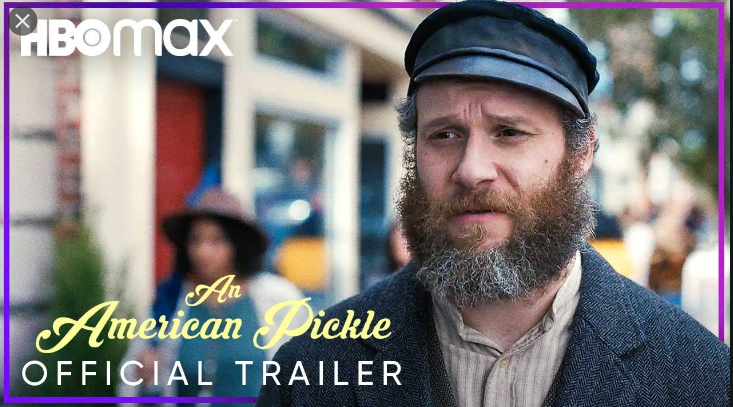
(Washington, D.C.) — Seth Rogen, the Jewish comedian, is promoting his new film, American Pickle, which will premiere on the HBO streaming service on August 6th.
Rogen plays a Jewish character named Herschel Greenbaum, “a struggling laborer who immigrates to America in 1920 with dreams of building a better life for his beloved family,” notes the movie review website, Rotten Tomatoes. “One day, while working at his factory job, he falls into a vat of pickles and is brined for 100 years. The brine preserves him perfectly and when he emerges in present day Brooklyn, he finds that he hasn’t aged a day. But when he seeks out his family, he is troubled to learn that his only surviving relative is his great grandson, Ben Greenbaum (also played by Rogen), a mild-mannered computer coder whom Herschel can’t even begin to understand.”
In a conversation this week with Marc Maron, a popular Jewish podcaster, Rogen unleashed what one Israeli newspaper called an “online firestorm” by attacking Israel and the Jewish religion.
- “Asked whether he agreed that Israel should exist, Rogen did not give a definite answer,” noted Israel Hayom.
- “To me it just seems an antiquated thought process. If it is for religious reasons, I don’t agree with it, because I think religion is silly,” Rogen said. “If it is truly for the preservation of Jewish people, it makes no sense, because again, you don’t keep something you’re trying to preserve all in one place — especially when that place is proven to be pretty volatile, you know? ‘I’m trying to keep all these things safe. I’m gonna put them in my blender and hope that’s that best place….That’ll do it!'”
- “The Canadian-US actor, who attended Jewish camp and whose parents met on a kibbutz in Israel, said the fact that the Jewish state was created on land where Palestinians,” reported The (UK) Guardian.
- “[As] a Jewish person I was fed a huge amount of lies about Israel my entire life,” living had always been omitted,” Rogen said. “They never tell you that, ‘Oh, by the way, there were people there’. They make it seem like it was just like sitting there, like the f—– door’s open.”
- “At one point, Maron pointed out that in the aftermath of the Holocaust, there was an effort to disperse Jewish refugees throughout various countries,” noted The Jewish Journal.
- “That’s a better strategy,” Rogen said. “You don’t keep all your Jews in one basket.”
- Maron said that his mother and her generation are “hung up on Israel and they find some comfort it. I’ve been there and I’m like, ‘I couldn’t imagine living here!’”
- “Rogen agreed,” noted the Journal, “although he acknowledged that Israel has some ‘nice parts.'”
- “Maron suggested that it isn’t taught so ‘when you get old enough you will make sure that money goes to Israel and that trees are planted and that you always speak highly of Israel and Israel must survive no matter what.'”
- “Yeah, and I don’t understand it at all,” Rogen replied. “And I think for Jewish people especially, who view themselves as progressive and who view themselves as analytical and who view themselves as people who ask a lot of questions and really challenge the status quo, like, what are we doing?”
While covering the controversy, as most Jewish publications have, this week, The Jerusalem Post noted that while Rogen “may have mixed feelings about his connection to Israel and his religious identity, as do many North American Jews,” Rogen’s mother, Sandy, “has no such reservations. She is one of the most beloved Jewish mothers on Twitter, where she has 113,000 followers and describes herself as ‘wife, mama, nana, lucky lady!”
The Post is on to something here — while Rogen certainly went rogue on Israel and Judaism, his sentiments are, unfortunately, far more reflective of American and Canadian Jews views than most people, including most Evangelicals, might understand.
These are not, however, views held by most American Jews.
A 2019 poll published by the American Jewish Committee found that only 38 percent of American Jews strongly agreed with the statement that “caring about Israel is a very important part of my being a Jew.”
The disconnect between the Bible — and the Biblical case for the importance of faith in God and the promises He made to Israel — and the values and beliefs of much of the Jewish community in North America is real, growing and concerning.
When Seth Rogen says, “I don’t understand it at all,” let’s be clear — he is not the only one.
—————————
—————————

